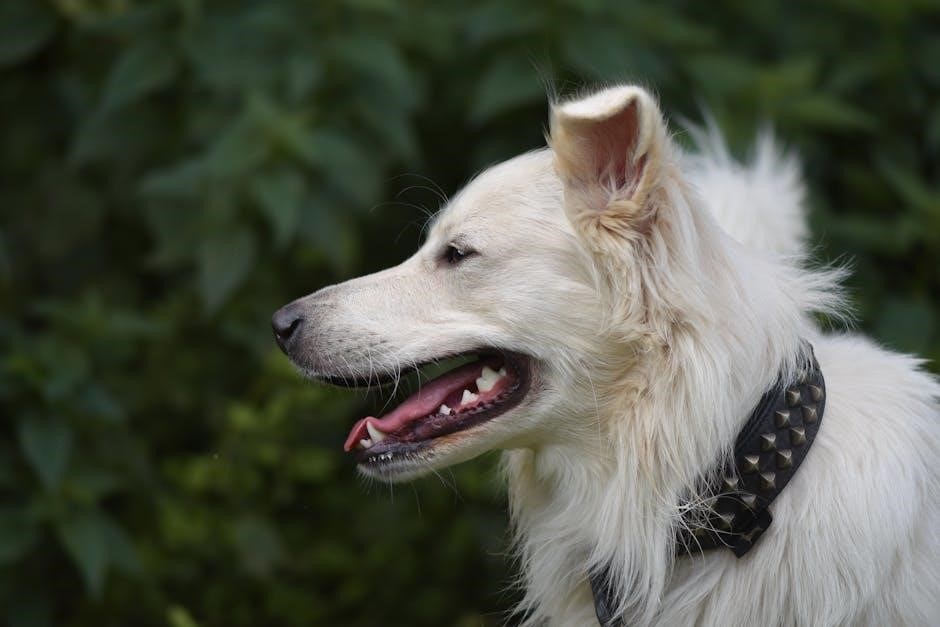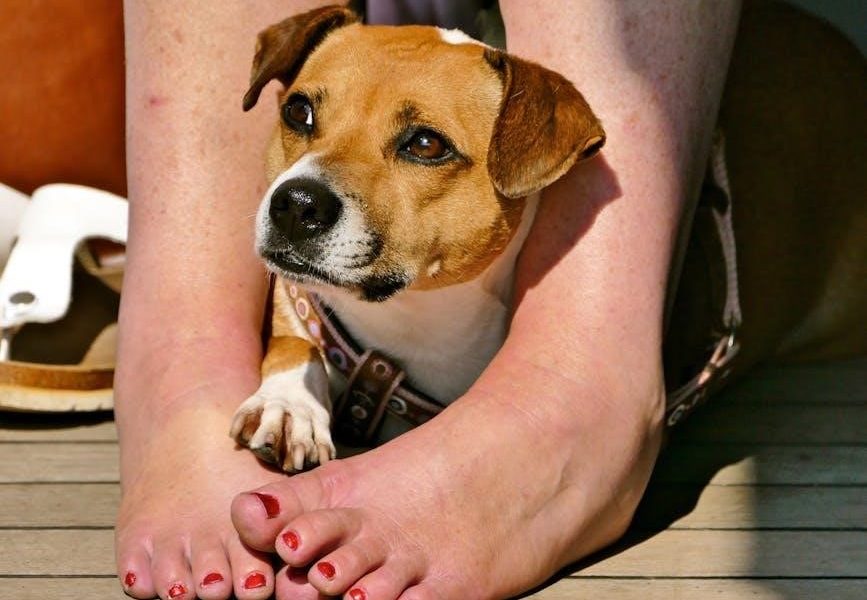Understanding the Role of a Guide Dog Puppy Raiser
A guide dog puppy raiser plays a vital role in training future service dogs‚ focusing on socialization‚ obedience‚ and foundational skills to prepare puppies for advanced training.
Overview of a Guide Dog Puppy Raiser’s Responsibilities
A guide dog puppy raiser is responsible for nurturing and training a puppy from an early age‚ focusing on socialization‚ obedience‚ and basic skills. They ensure the puppy adapts to various environments‚ interacts positively with people and animals‚ and learns essential commands. Raisers also handle daily care‚ including feeding‚ grooming‚ and vet visits. They follow specific guidelines set by the organization to prepare the puppy for advanced training. This role requires patience‚ consistency‚ and a commitment to the puppy’s development. While the primary focus is on training‚ raisers often form strong emotional bonds with the puppies‚ knowing their efforts contribute to the puppy’s future as a guide dog for someone in need.
The Importance of Volunteer Work in Guide Dog Training
Volunteer puppy raisers play a crucial role in guide dog training by providing the initial care and socialization that shapes a puppy’s future as a service dog. Their dedication ensures puppies are well-adjusted and prepared for advanced training. Volunteers contribute countless hours‚ often without compensation‚ driven by the desire to assist individuals with visual impairments. This selfless effort significantly reduces costs for organizations‚ allowing more resources to be allocated to training and placement. The emotional support and personalized attention from volunteers are irreplaceable‚ highlighting the importance of their contributions to the success of guide dog programs and the lives of those they serve;
Emotional and Psychological Benefits of Being a Puppy Raiser
Raising a guide dog puppy offers profound emotional and psychological rewards. Volunteers experience a deep sense of fulfillment knowing they are contributing to a noble cause‚ enhancing the life of someone with a visual impairment. The bond formed with the puppy provides companionship and joy‚ while the opportunity to give back to the community fosters a sense of purpose. Additionally‚ the process of teaching and nurturing a puppy can boost self-esteem and create lasting memories. Many puppy raisers also find personal growth through the challenges and successes encountered during the training journey‚ making the experience deeply enriching and rewarding on multiple levels.

Financial Aspects of Being a Guide Dog Puppy Raiser
While guide dog puppy raisers are often unpaid volunteers‚ organizations may reimburse expenses. Some receive stipends or allowances to support puppy care and training costs.
Understanding the Costs Involved in Raising a Guide Dog Puppy
Raising a guide dog puppy involves significant expenses‚ including food‚ veterinary care‚ toys‚ and training supplies. Monthly costs can range from $100 to $300‚ depending on the puppy’s size and needs.
Volunteers often cover these expenses out of pocket‚ though some organizations offer reimbursement for approved expenditures. Additionally‚ vet bills for vaccinations and preventatives add to the financial burden.
Despite these costs‚ many puppy raisers find the experience rewarding‚ knowing their efforts contribute to a greater cause. Organizations may also provide support‚ such as donated supplies or stipends‚ to help offset these expenses.
Expenses Related to Puppy Care and Training
The primary expenses for raising a guide dog puppy include high-quality food‚ vet bills‚ and training equipment; Monthly food costs range from $50 to $75‚ depending on the puppy’s size.
Veterinary care‚ including vaccinations and flea prevention‚ can add another $50 to $100 per month. Training supplies‚ such as leashes‚ collars‚ and crates‚ are also essential and can cost around $100 initially.
Additionally‚ heartworm medication and occasional grooming expenses contribute to the overall financial commitment. While some organizations reimburse approved expenses‚ others require raisers to cover costs personally‚ making it important to budget carefully.
Financial Support and Reimbursement from Organizations
Many guide dog organizations provide financial support to puppy raisers to help cover expenses. Reimbursements often include costs for food‚ vet bills‚ and training supplies.
Some organizations offer monthly stipends to offset expenses‚ while others reimburse based on receipts. Additionally‚ fundraising opportunities are available to help raisers cover costs.
Organizations may also provide free or discounted supplies‚ such as leashes and crates‚ to support raisers. This financial assistance ensures that the focus remains on the puppy’s development rather than the cost.
Overall‚ the level of support varies by organization‚ but most aim to make the experience accessible and affordable for dedicated volunteers.
Tax Deductions and Benefits for Puppy Raisers
Puppy raisers may be eligible for tax deductions related to their expenses‚ such as food‚ veterinary care‚ and supplies.
Many organizations provide receipts for these expenses‚ which can be itemized as charitable contributions. Additionally‚ mileage for training-related travel may be deductible.
While puppy raisers are not paid a salary‚ these deductions help offset costs. Some organizations also offer non-monetary benefits‚ such as free training equipment or access to exclusive events.
It’s important to consult a tax professional to ensure compliance with IRS guidelines. These deductions and benefits are a way to recognize the valuable contribution of puppy raisers to guide dog programs.

Salary and Compensation for Guide Dog Puppy Raisers
Guide dog puppy raisers are typically volunteers‚ not salaried employees. They often receive non-monetary benefits‚ such as emotional rewards and the satisfaction of contributing to a vital cause.
Typical Salary Ranges for Professional Puppy Raisers
Professional guide dog puppy raisers‚ though rare‚ may receive modest compensation. Salaries typically range between $20‚000 and $40‚000 annually‚ depending on experience and the organization. Some non-profit groups offer stipends or allowances to cover living expenses while raising puppies. However‚ most puppy raisers are volunteers‚ driven by altruism rather than financial gain. Compensation often comes in the form of emotional fulfillment and the knowledge of contributing to a life-changing cause. Organizations may also provide reimbursement for puppy-related expenses‚ such as food‚ vet bills‚ and training materials. This financial support helps offset the costs incurred during the puppy-raising journey.
Compensation Packages from Guide Dog Organizations
Guide dog organizations often provide compensation packages to puppy raisers to offset expenses. These packages may include reimbursement for puppy food‚ veterinary care‚ and training supplies. Some organizations offer monthly stipends or allowances to help cover the costs of raising a puppy. Additionally‚ organizations may provide mileage reimbursement for travel related to training sessions or meetings. While these packages are not a salary‚ they are designed to support raisers financially. Many organizations also provide access to training resources‚ veterinary care networks‚ and community support. These compensation packages vary by organization but aim to ease the financial burden of raising a guide dog puppy.
Stipends and Allowances for Puppy Raisers

Guide dog organizations often provide stipends and allowances to puppy raisers to help cover expenses. These stipends may be monthly payments or reimbursements for specific costs like food‚ toys‚ and vet visits. Allowances are typically offered to offset the financial burden of raising a puppy. Some organizations provide a fixed stipend per month‚ while others reimburse based on receipts. Additionally‚ travel allowances for training sessions or meetings may be included. These stipends and allowances are not a salary but are designed to support raisers in their role. They vary by organization and may depend on the puppy’s age‚ size‚ and specific needs. raisers are encouraged to check with their organization for details on available support.
Non-Monetary Benefits for Puppy Raisers

Beyond financial support‚ puppy raisers gain immense non-monetary benefits. The opportunity to make a life-changing impact for individuals with visual impairments brings deep personal satisfaction. Raisers develop strong bonds with their puppies‚ fostering emotional connections and a sense of purpose. They also gain valuable skills in dog training‚ behavior management‚ and responsibility. Many organizations offer access to training sessions and workshops‚ enhancing their knowledge and expertise. Additionally‚ puppy raisers often build lasting friendships within the guide dog community. The fulfillment of contributing to someone’s independence is incredibly rewarding‚ creating a lasting sense of pride and accomplishment. These non-monetary benefits are often cited as the most meaningful aspects of the role.

Factors Influencing the Salary of a Guide Dog Puppy Raiser
Experience‚ location‚ organization size‚ training duration‚ and cost of living are key factors influencing a puppy raiser’s salary‚ impacting compensation and benefits provided.
Experience and Skill Level of the Puppy Raiser
The salary and compensation for guide dog puppy raisers often depend on their experience and skill level. Those with more experience in raising and training puppies are typically more efficient and effective‚ leading to higher success rates. Advanced skills in puppy socialization‚ obedience training‚ and behavior management can result in better outcomes‚ making these individuals more valuable to the organization. Organizations may offer higher stipends or compensation to experienced raisers who consistently produce well-trained puppies. Additionally‚ puppy raisers with specialized skills‚ such as handling specific breeds or addressing behavioral challenges‚ may receive additional recognition or financial support. Experience and expertise directly influence the level of compensation provided by guide dog organizations.

Location and Cost of Living Impact on Salary
The location and cost of living in a puppy raiser’s area can influence their compensation. Organizations often consider regional cost differences when determining stipends or reimbursements. For instance‚ puppy raisers in urban areas with higher living expenses may receive larger allowances to cover costs like housing‚ transportation‚ and food. Conversely‚ those in rural areas with lower expenses might receive slightly less financial support. This ensures that the compensation remains fair and reflects the local economic conditions. While the base salary structure may remain consistent‚ adjustments are made to account for varying living costs‚ ensuring puppy raisers can adequately care for their puppies regardless of where they live.
Organization-Specific Salary Structures
Guide dog puppy raiser salaries and compensation structures vary significantly depending on the organization. Some organizations offer stipends or allowances‚ while others provide reimbursement for expenses. Larger‚ well-funded organizations may offer more generous compensation packages‚ while smaller non-profits might have limited resources. Additionally‚ some organizations tie compensation to the puppy raiser’s level of experience or the number of puppies they’ve raised. The specific mission‚ funding‚ and policies of each organization influence how salaries are structured. As a result‚ puppy raisers should research the compensation models of individual organizations to understand what financial support they can expect during their involvement in the program.
Duration of Puppy Training and Its Impact on Compensation
The duration of puppy training significantly influences compensation for guide dog puppy raisers. Typically‚ the longer the training period‚ the higher the stipend or reimbursement provided by organizations. Most programs last 12–18 months‚ during which raisers incur expenses for food‚ vet care‚ and supplies. Organizations often structure compensation to reflect the time commitment‚ offering monthly allowances or lump sums upon program completion. Some groups may also provide additional funds for puppies in extended training. The financial support is designed to offset the costs of raising a puppy‚ ensuring raisers are not burdened financially. This structure helps maintain consistency and fairness in compensation across the training journey.
How to Become a Guide Dog Puppy Raiser
To become a guide dog puppy raiser‚ research organizations offering such programs to understand their specific requirements and application processes. Ensure you meet eligibility criteria‚ such as age and living situation‚ and assess your ability to commit time and resources to raising a puppy. Many organizations provide training and support for new raisers‚ which is crucial for equipping you with the necessary skills. Financial considerations vary‚ so inquire about reimbursement policies. Networking with current or former puppy raisers can offer valuable insights and tips. Prepare emotionally for the eventual transition of the puppy to advanced training. By understanding the responsibilities and preparing adequately‚ you can contribute meaningfully to the important work of guide dog training.
Basic Requirements and Eligibility Criteria
To qualify as a guide dog puppy raiser‚ candidates must meet specific eligibility criteria. Typically‚ applicants must be at least 18 years old‚ though some organizations allow younger participants with parental involvement. A stable living situation with a suitable environment for a puppy is essential‚ including a securely fenced yard in many cases. Prospective raisers must demonstrate patience‚ consistency‚ and a commitment to training. They should also have the time to dedicate to puppy care‚ socialization‚ and regular training sessions. Many organizations require a formal application‚ interviews‚ and home visits to assess suitability. Additionally‚ raisers must agree to follow the organization’s guidelines and protocols for raising future guide dogs.
Application Process for Puppy Raiser Programs
The application process for guide dog puppy raiser programs typically begins with an online form‚ which asks for personal and household information. Applicants are often required to detail their experience with dogs‚ lifestyle‚ and ability to commit time to raising a puppy. Following submission‚ many organizations conduct interviews to assess suitability. Home visits may also occur to ensure the environment is safe and appropriate for a puppy. Some programs require attendance at an orientation or meeting with current puppy raisers. Once approved‚ applicants are paired with a puppy and begin their training journey. The process is designed to ensure both the raiser and puppy thrive in the program.
Training and Support Provided by Organizations
Guide dog organizations offer comprehensive training and support to puppy raisers to ensure success. Initial training sessions are provided to teach foundational skills‚ such as basic obedience and house manners. Many organizations supply detailed training manuals and online resources for ongoing learning. Puppy raisers also receive one-on-one coaching from experienced trainers. Regular group meetings and workshops are held to address challenges and share tips. Additionally‚ organizations often cover costs related to vet care and essential supplies‚ reducing financial burdens. This robust support system helps raisers feel confident and prepared to raise a well-socialized puppy‚ fostering a positive and productive experience for both the raiser and the puppy.
Real-Life Perspectives and Testimonials
Inspiring testimonials from experienced puppy raisers highlight the emotional rewards‚ sense of fulfillment‚ and life-changing impact of contributing to a guide dog’s journey.
Interviews with Experienced Guide Dog Puppy Raisers
Experienced puppy raisers share heartfelt insights into their journeys‚ emphasizing the emotional rewards of nurturing future guide dogs. Many highlight the joy of watching puppies grow into confident companions‚ transforming lives. They often mention the challenges‚ such as separation when the dog begins formal training‚ but stress the fulfillment of knowing their efforts make a difference.
While financial compensation varies‚ raisers consistently express that the true reward lies in the impact they have on individuals with disabilities. Their stories illustrate a deep commitment to service and a passion for empowering others through these incredible animals.

Case Studies of Successful Puppy Raiser Programs
Successful puppy raiser programs demonstrate the profound impact of dedicated volunteers. For instance‚ a national guide dog organization reported a 90% placement rate for puppies raised through their program. One notable case involved a raiser who successfully trained over 15 puppies‚ each going on to assist individuals with visual impairments. These programs highlight the importance of structured training‚ consistent care‚ and the emotional bonds formed between raisers and puppies. They also illustrate how collective efforts create life-changing outcomes for both the dogs and their future partners‚ embodying the essence of community-driven compassion and dedication.
Lessons Learned from Current Puppy Raisers
Current puppy raisers often highlight the emotional and practical challenges of the role. Many emphasize the importance of patience‚ consistency‚ and adaptability when training a puppy. They also stress the need for strong communication with guide dog organizations to navigate challenges effectively. Additionally‚ raisers frequently mention the emotional difficulty of eventual separation from the puppy‚ but also the immense pride in knowing their efforts contribute to someone’s independence. These experiences underscore the importance of resilience‚ dedication‚ and understanding the broader purpose of the work‚ which often outweighs financial compensation for many raisers.
Being a guide dog puppy raiser is a rewarding yet challenging experience‚ offering emotional fulfillment and the chance to make a life-changing impact.

Guide dog puppy raisers are typically volunteers‚ not salaried employees‚ as their primary reward is the joy of contributing to a life-changing mission. While some organizations offer stipends or reimbursements for expenses‚ these are not consistent across all groups. Professional raisers may receive compensation‚ but it varies widely based on experience and location. Non-monetary benefits‚ such as emotional fulfillment and community recognition‚ are often valued more than financial gain. The focus for most raisers is the satisfaction of helping someone gain independence‚ making the role deeply rewarding beyond any monetary compensation.
Encouragement and Motivation for Aspiring Puppy Raisers
Becoming a guide dog puppy raiser is a rewarding and life-changing experience that offers immense personal fulfillment. While the role is primarily volunteer-based‚ the joy of nurturing a puppy into a confident guide dog is unparalleled. Witnessing the transformative journey of a puppy becoming a vital companion for someone in need is deeply satisfying. The sense of community and support from organizations and fellow raisers further enriches the experience. For those passionate about animals and helping others‚ this role provides an opportunity to make a lasting impact. It’s a chance to grow personally while contributing to a noble cause‚ leaving a legacy of love and independence.

Resources for Further Information and Support
For those interested in becoming a guide dog puppy raiser‚ numerous resources are available to provide guidance and support. Organizations like Guide Dogs for the Blind and The Seeing Eye offer detailed information on their websites‚ including application processes and training tips. Additionally‚ the International Guide Dog Federation provides global insights and best practices. Many organizations host webinars‚ workshops‚ and local meetups to connect aspiring raisers with experienced volunteers. Reaching out to local puppy raising clubs or joining online forums can also offer valuable networking opportunities. These resources ensure that prospective puppy raisers are well-equipped to embark on this rewarding journey with confidence and support.
